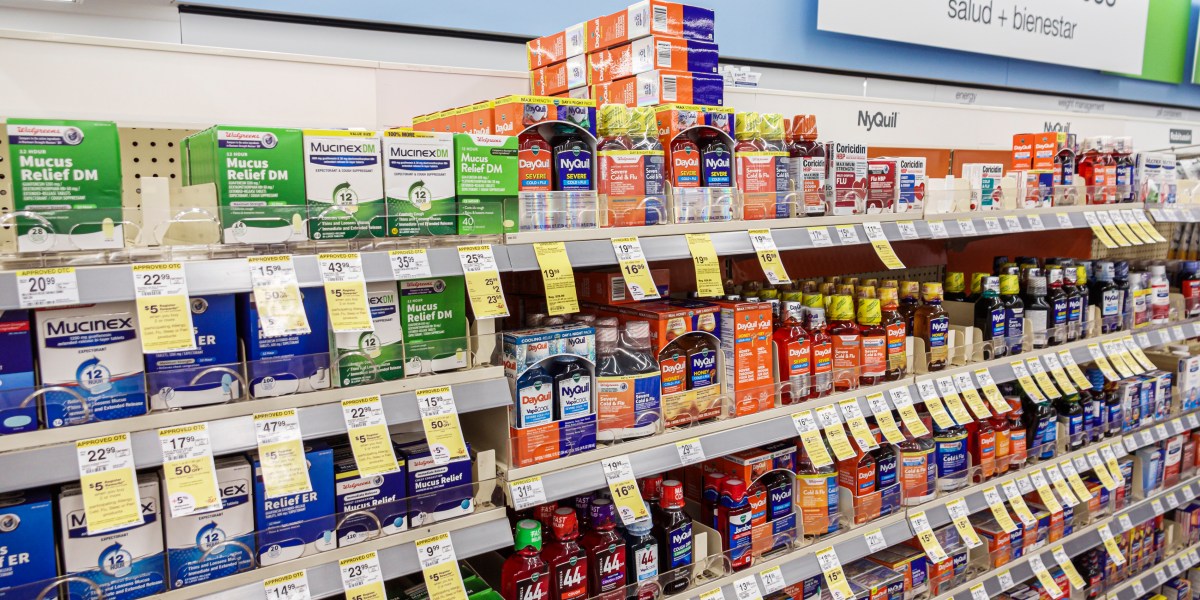

While it may seem like the only difference between extended-release Mucinex and its generic store-brand counterpart is the price tag, the latter potentially exposes users to a deadly cancer-causing chemical.
Millions of Americans who buy the store-brand option at various major US chains are unknowingly choosing a drug that risks containing a potent carcinogen called benzene, according to a Bloomberg analysis of government data. Benzene can cause blood cancers such as leukemia and lymphoma.
Just looking at the boxes, consumers wouldn’t easily be able to spot the difference between the two medicines. They both contain the same active ingredient, guaifenesin. And while the inactive ingredients differ, benzene isn’t listed among them. It instead lurks in an inactive ingredient, a white powder called a carbomer.
Both medicines use carbomers to create an extended-release phenomenon that helps relieve symptoms over a 12-hour period. But while the brand-name version, sold by the British drugmaker Reckitt Benckiser Group Plc, uses a carbomer that isn’t made with benzene, the generic ones sold as store brands by CVS, Walmart, Target and Walgreens use a cheaper one made with the harmful chemical, Bloomberg found.
US regulators have allowed drugmakers to use benzene for decades, even though international authorities have said they shouldn’t. In recent years, testing has found dangerously high levels of the chemical in some products in the US, raising concerns. Last year, the US Food and Drug Administration said the ingredient would be phased out of pharmaceutical use in 2025, a deadline that has been extended to 2026 following industry complaints.
“The FDA is continuously working to ensure that all drugs meet the highest quality standards with the health and well-being of Americans top of mind,” Amanda Hils, a spokesperson for the agency, said.
In response to Bloomberg’s questions about generic Mucinex having benzene, CVS Health Corp. said the company would work with its supplier to replace the ingredient. Walgreens Boots Alliance Inc. said it works with its suppliers to follow FDA regulations. Walmart Inc., Target Corp. and Rite Aid Corp. didn’t respond to requests for comment.
The FDA has also been studying drugs sold in gel form that use carbomers. Tablets, like generic Mucinex, are not included in that analysis, Hils said. She didn’t offer details on the results of the testing.
Bloomberg’s analysis found a few dozen drugs besides generic Mucinex that still contain carbomers made using benzene including Walgreens’ version of Anbesol, an oral pain reliever; Walmart’s Equate brand face moisturizer with sunscreen; and Rite Aid’s version of Bengay muscle rub.
While most shoppers trust that store-brand medicines are just as safe and effective as brand-name ones, that’s not always true. Generic drugs of all sorts, from eye drops to cancer treatments, have been linked to factories using unsafe practices, often to cut costs.
When it comes to store-brand generics, the retailer isn’t responsible for the quality of the products it sells. Instead, oversight and liability lies with the manufacturer.
In the case of generic Mucinex, the major US chains all source their extended-release mucus-relief medicine from the same New Jersey company, Amneal Pharmaceuticals Inc. The drugmaker didn’t respond to requests for comment, including questions about whether it tested its drugs for potential benzene contamination or how it plans to comply with upcoming FDA regulations.
Swapping ingredients is “dramatically costly and dramatically time consuming” because it requires additional testing and another round of FDA approval, said Vivek Dave, an associate professor of pharmaceutical sciences at St. John Fisher University in New York.
Prices for carbomers are not made public and companies that sell them contacted by Bloomberg didn’t respond to inquiries. On Amazon, India-based Bangalore Fine Chemicals lists about four ounces of a carbomer made with benzene for $4 less than the one without. Drugmakers buying in bulk would potentially have to pay hundreds of thousands of dollars more for a less risky carbomer.
The inventor of Mucinex says there’s no scientific or therapeutic reason to use a carbomer made with benzene. “Clearly, benzene is not viewed fondly,” said Jeff Keyser, who’s now the chief executive officer of a pharmaceutical startup called Renibus Therapeutics in Texas. “There are other things out there they can use.”















